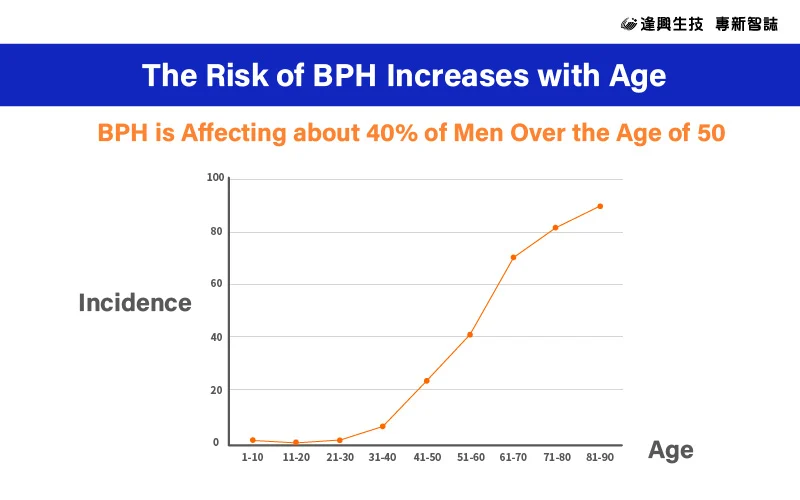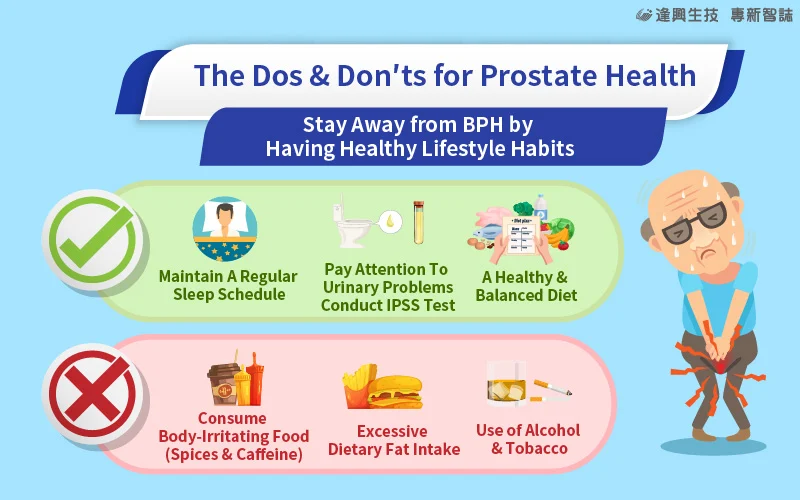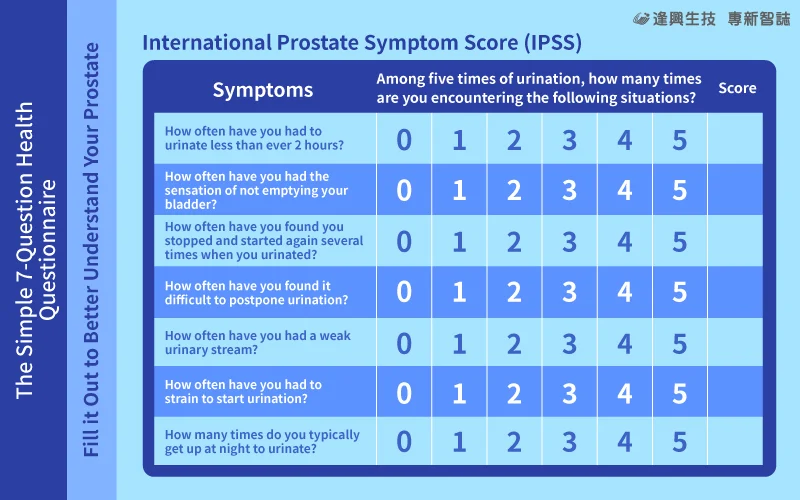
The Health Problem Experienced In Middle Adulthood That Men Are Too Shy To Discuss – Male Prostate Enlargement!-Part. 01

[et_pb_section fb_built=”1″ _builder_version=”3.22″ global_colors_info=”{}”][et_pb_row _builder_version=”3.25″ background_size=”initial” background_position=”top_left” background_repeat=”repeat” global_colors_info=”{}”][et_pb_column type=”4_4″ _builder_version=”3.25″ custom_padding=”|||” global_colors_info=”{}” custom_padding__hover=”|||”][et_pb_text content_tablet=”” content_phone=”
Increase Your Awareness of Men’s Preventable Health Issues
Benign Prostatic Hyperplasia (BPH) causes uncomfortable urinary symptoms and men are often too shy to talk about their prostate issues and about how to increase prostate health. The common signs of BPH are such as blocking the flow of urine out of the bladder and having difficulties emptying the bladder. The more severe complications are kidney inflammation, vesical calculus, uremia, and kidney failure. Besides, their sexual performance may further be affected.

According to Taiwanese Association of Andrology (TAA), the incidence rates for BPH increase with age, mainly affecting the men over the age of 40. The statistics suggest that BPH is affecting about 20% of the men aged between 40 to 50, more than 40% of the men aged between 50 to 60, and almost 90% of the men older than 80 years old. Besides, prostate lesion may possibly turn into cancer if left untreated. WHO announced that prostate cancer ranked the second leading cause of death in males in 2018.
Simultaneously, many statistics indicate that BPH is going to become more common with the changes in population composition and modern dietary patterns. According to United Nations (UN), the number of the individuals over 65 years old is projected to reach 1.5 billion, accounting for one-sixth of the world population by 2050 with the declining fertility rates and rising life expectancy going on worldwide. The proportion of the men aged 65 years and older increasing globally has raised more awareness about the importance regarding prostate health.
Enhance Better Prostate Health by Making Healthier Choices

In addition to aging, obesity also plays a critical role in BPH. According to the research conducted on 571 males that has been recently published in International Neurourology Journal, there are strong correlations between weight, waist circumference, body fat, and visceral fat and the increase in the volume of the prostate. People nowadays are having unhealthy diet which causes weight gain that further leads to BPH.
Other lifestyle factors such as irregular sleeping patterns and often staying up late could affect prostate health as well; therefore, conducting regular check-ups on prostate, eating healthy, and having a regular sleeping schedule have become particularly important nowadays.
First, it is necessary to realize that frequent urination and excessive urination at night are not part of the normal aging process. Many might consider unsmooth urination as the signs of aging and not plan on seeking any medical treatment until the condition gets out of hand, resulting in kidney failure, uremia, or even kidney dialysis.
Furthermore, in order to prevent the prostate problems from getting worse, conducting a periodic self-assessment with International Prostate Symptom Score (IPSS) is highly recommended. By answering seven questions, you could get to know your urinary conditions better for early treatment. The total score will suggest how severe your symptoms are. The following chart with the scores corresponding to a scale that evaluates the severity is provided for your reference.

(Picture:IPSS Assessment; Source:Taiwanese Continence Society)
- Score ranging from 0 to 7 : indicating mild symptoms which could be improved with medication, but follow-up examination is still required.
- Score ranging from 8 to 19 : indicating moderate symptoms which more than 60% of the patients could be treated with medications. The ones with higher scores may need to undergo surgery.
- Score ranging from 20 to 35 : indicating severe symptoms which more than 50% of the patients require surgical treatment and the rest would need to take long-term medication to control the symptoms.
(Source:Common Health Magazine – Fei Yu-Ching Having Prostatic Obstruction? Seven-Question Self Assessment 2019/11/08)
In addition to conducting self-evaluation on a regular basis, eating healthy is crucial to prevention of prostate enlargement and related complications. Many healthy lifestyle habits could be adopted to reduce the chance of developing prostate enlargement. For instance, choose the cooking methods such as steaming, boiling, simmering, and poaching over pan-frying and deep-frying, lower the consumption of fat, animal viscera, chili pepper, wasabi, coffee, strong tea, and coke, avoid drinking and smoking, and replenish adequate amount of nutrients. According to the medical research, increasing the intake of the following food could help promote prostate health.
- Oyster: help keep male hormones in check, maintain the normal function of the prostate, and enhance performance.
- Tomato: tomatoes are rich in vitamin A and C and lycopene which help remove free radicals, delay aging, and alleviate the symptoms of BPH.
- Beans: soybean, edamame, and pea could decrease the hormonal stimuli to achieve the reduction in prostate cell production.
- Fiber Rich Foods: several studies suggest that the chance of developing prostate problems for the men having high fruit and vegetable consumption is lower than the men having insufficient vegetable consumption by 47%. Increased consumption of whole grain foods, vegetables, and fruits has a positive impact on prostate health.
BPH and related complications could be delayed by having sufficient intake of prostate-benefiting nutrients; therefore, nutrient replenishment is a real need for all the men.
If wishing to know more regarding the nutrients we utilize, check out our next column :The Health Problem Experienced In Middle Adulthood That Men Are Too Shy To Discuss – Male Prostate Enlargement!-Part. 02 for more information.
Wel-Bloom Bio-Tech, experts in dietary supplement foods research and development in Taiwan
” content_last_edited=”on|phone” admin_label=”Text” _builder_version=”4.14.5″ background_size=”initial” background_position=”top_left” background_repeat=”repeat” hover_enabled=”0″ global_colors_info=”{}” sticky_enabled=”0″]
Increase Your Awareness of Men’s Preventable Health Issues
Benign Prostatic Hyperplasia (BPH) causes uncomfortable urinary symptoms and men are often too shy to talk about their prostate issues and about how to increase prostate health. The common signs of BPH are such as blocking the flow of urine out of the bladder and having difficulties emptying the bladder. The more severe complications are kidney inflammation, vesical calculus, uremia, and kidney failure. Besides, their sexual performance may further be affected.

According to the Taiwanese Association of Andrology (TAA), the incidence rates for BPH increase with age, mainly affecting men over the age of 40. The statistics suggest that BPH is affecting about 20% of the men aged between 40 to 50, more than 40% of the men aged between 50 to 60, and almost 90% of the men older than 80 years old. Besides, the prostate lesions may possibly turn into cancer if left untreated. WHO announced that prostate cancer ranked the second leading cause of death in males in 2018.
Simultaneously, many statistics indicate that BPH is going to become more common with the changes in population composition and modern dietary patterns. According to United Nations (UN), the number of individuals over 65 years old is projected to reach 1.5 billion, accounting for one-sixth of the world population by 2050 with the declining fertility rates and rising life expectancy going on worldwide. The proportion of men aged 65 years and older increasing globally has raised more awareness about the importance of prostate health.
References:
Benign Prostatic Hyperplasia Treatment Market to be worth nearly US$ 12 Billion by 2027- TMR
https://reurl.cc/E2rKpK
Global Benign Prostatic Hypertrophy Drugs Market Report 2020: Market was Valued at $4.03 Billion in 2018 and is Expected to Grow to $5.65 Billion through 2022 – ResearchAndMarkets.com
https://reurl.cc/nn1VD8
World population aging Highlight 2020
https://www.un.org/development/desa/pd/sites/www.un.org.development.desa.pd/files/files/documents/2020/Sep/un_pop_2020_pf_ageing_10_key_messages.pdf
Examining the Relationship Between Obesity and Prostate Cancer
https://www.ncbi.nlm.nih.gov/pmc/articles/PMC1550782/
Dr. David Samadi Explains Why Enlargement Of The Prostate Is More Likely In Obese Men
https://prostatecancer911.com/dr-david-samadi-explains-why-enlargement-of-the-prostate-is-more-likely-in-obese-men/
Enhance Better Prostate Health by Making Healthier Choices

In addition to aging, obesity also plays a critical role in BPH. According to the research conducted on 571 males that have been recently published in International Neurourology Journal, there are strong correlations between weight, waist circumference, body fat, and visceral fat and the increase in the volume of the prostate. People nowadays are having an unhealthy diet which causes weight gain that further leads to BPH.
Other lifestyle factors such as irregular sleeping patterns and often staying up late could affect prostate health as well; therefore, conducting regular check-ups on the prostate, eating healthy, and having a regular sleeping schedule have become particularly important nowadays.
First, it is necessary to realize that frequent urination and excessive urination at night are not part of the normal aging process. Many might consider unsmooth urination as a sign of aging and not plan on seeking any medical treatment until the condition gets out of hand, resulting in kidney failure, uremia, or even kidney dialysis.
Furthermore, in order to prevent prostate problems from getting worse, conducting a periodic self-assessment with the International Prostate Symptom Score (IPSS) is highly recommended. By answering seven questions, you could get to know your urinary conditions better for early treatment. The total score will suggest how severe your symptoms are. The following chart with the scores corresponding to a scale that evaluates the severity is provided for your reference.

(Picture: IPSS Assessment; Source: Taiwanese Continence Society)
- Score ranging from 0 to 7: indicating mild symptoms which could be improved with medication, but follow-up examination is still required.
- Score ranging from 8 to 19: indicating moderate symptoms which more than 60% of the patients could be treated with medications. The ones with higher scores may need to undergo surgery.
- Score ranging from 20 to 35: indicating severe symptoms in which more than 50% of the patients require surgical treatment and the rest would need to take long-term medication to control the symptoms.
(Source: Common Health Magazine – Fei Yu-Ching Having Prostatic Obstruction? Seven-Question Self Assessment 2019/11/08)
In addition to conducting self-evaluation on a regular basis, eating healthy is crucial to the prevention of prostate enlargement and related complications. Many healthy lifestyle habits could be adopted to reduce the chance of developing prostate enlargement. For instance, choose the cooking methods such as steaming, boiling, simmering, and poaching over pan-frying and deep-frying, lower the consumption of fat, animal viscera, chili pepper, wasabi, coffee, strong tea, and coke, avoid drinking and smoking, and replenish the adequate amount of nutrients. According to medical research, increasing the intake of the following food could help promote prostate health.
- Oyster: help keep male hormones in check, maintain the normal function of the prostate, and enhance performance.
- Tomato: Tomatoes are rich in vitamin A and C and lycopene which help remove free radicals, delay aging, and alleviate the symptoms of BPH.
- Beans: soybean, edamame, and pea could decrease the hormonal stimuli to achieve the reduction in prostate cell production.
- Fiber-Rich Foods: several studies suggest that the chance of developing prostate problems for the men having high fruit and vegetable consumption is lower than the men having insufficient vegetable consumption by 47%. Increased consumption of whole-grain foods, vegetables, and fruits has a positive impact on prostate health.
BPH and related complications could be delayed by having a sufficient intake of prostate-benefiting nutrients; therefore, nutrient replenishment is a real need for all men.
References:
Can BPH cause kidney failure?
https://www.medicalnewstoday.com/articles/321899
Can BPH Cause Renal Failure?
https://www.healthline.com/health/BPH-renal-failure-know-your-risks
If wishing to know more regarding the nutrients we utilize, check out our next column: The Health Problem Experienced In Middle Adulthood That Men Are Too Shy To Discuss – Male Prostate Enlargement!-Part. 02 for more information.
Wel-Bloom Bio-Tech, experts in dietary supplement foods research and development in Taiwan
[/et_pb_text][/et_pb_column][/et_pb_row][/et_pb_section]

Wel-Bloom Bio-Tech
Leader of Jelly Supplement
-
Phone +886-2-33225555
-
Fax +886-2-3322-5966
-
Email [email protected]
-
LINE Official Account @welbloom
-
LinkedIn Welbloom BioTech
Contact Us
We will reply them as soon as possible.


